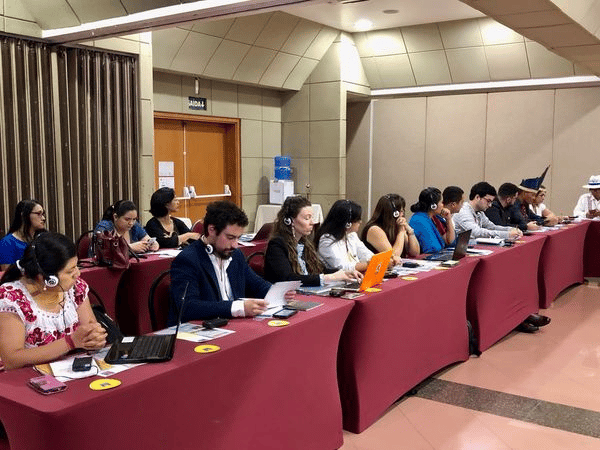
Successful Seminar “Indigenous Knowledge for Integral Water Management in Latin America and the Caribbean”
Report on “Indigenous Knowledge for Integral Water Management in Latin America and the Caribbean ” Manaus, Brazil August 8-9 from CODIA. CEE’s Mindahi Bastida was pleased to participate (see photo below).
CODIA, September 6, 2019
Within the framework of the International Day of Indigenous Peoples, UNESCO convened leaders from Panama, Guatemala, Ecuador, Mexico and Colombia, as well as local communities in Manaus around the Seminar “Indigenous Knowledge for Integral Water Management in Latin America and the Caribbean ”(Manaus, Brazil August 8-9). The meeting focused on the discussion about the sociocultural, technical, legal, economic and political aspects that the native peoples of the region have taken in the area of water management. Organized by the International Hydrological Program (PHI) of UNESCO together with the UNESCO Office in Brasilia and Quito, the Conference of Ibero-American Water Directors (CODIA), the Agência Nacional de Águas (ANA), with the collaboration of the Organization of the Amazon Cooperation Treaty (ACTO).
With the participation of Mr. Oscar Cordeiro Netto, Director of the ANA; Mr. César de las Casas, Executive Director of OTCA; Fabio Eon (UNESCO Brasilia); Ms. Karla Bitar, Superintendent of the Amazon National Historical and Artistic Patrimony Institute (IPHAN AM); and Mrs. Marcivana Rodrigues Paiva, Coordinator of the Coordination of Indigenous Organizations of Amazônia Brasileira (COIAB), opened the seminar “Indigenous Knowledge for Integral Water Management in Latin America and the Caribbean” in Manaus, Brazil on the 8th of August at 9:00 a.m.
The Seminar was promoted within the framework of the International Day of Indigenous Peoples as an instance to exchange on the Sustainable Development Goals and their approach in relation to the knowledge of the native peoples about water management with the aim of generating recommendations for international agencies, UNESCO, indigenous peoples, around this theme.
The relationship between indigenous peoples and water resources inspires an approach to water as a human right and a common good, as well as providing the search for new technologies and forms of organization that guarantee water supply to the continent. The inclusion and knowledge of indigenous practices and techniques used in the resolution of water-related conflicts is often important as valuable knowledge for government organizations, businesses and civil society.
The event had a wide regional call through the honorable presence of the Secretary of Water (Ecuador), Mr. Humberto Cholango, and indigenous leaders linked to the management of water resources of Panama, Guatemala, Ecuador, Mexico and Colombia, professionals from the water sector of Peru and Chile as well as from local communities in Manaus. In addition, the UNESCO Chair in Water and Culture (UdelaR, Uruguay) and the UNESCO Chair in Sustainability of Water Resources (San Carlos de Guatemala) joined this initiative.


